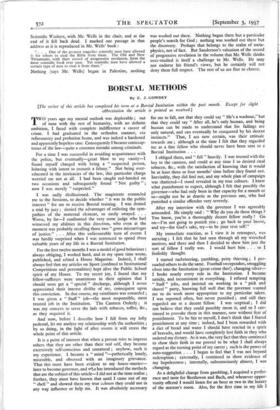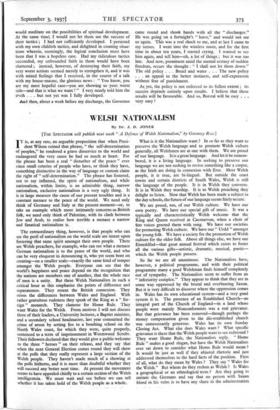BORSTAL METHODS
By E. J. GOWDEY
[The writer of this article has completed his term at a Borstal Institution within the past month. Except for slight abbreviation the article is printed as received.] TWO years ago my mental outlook was deplorable ; out of tune with the rest of humanity, with no definite ambition, I faced with complete indifference a career of crime. I had graduated in the orthodox manner, via reformatory and probation home, and was indeed a hardened and apparently hopeless case. Consequently I became contemp- tuous of the law—quite a common mistake among criminals.
For a time I was successful in avoiding acquaintance with the police, but eventually—great blow to my vanity—I found myself charged with being a " suspected person, loitering with intent to commit a felony." Not being over- educated in the intricacies of the law, this particular charge worried me not at all. I had been caught red-handed on two occasions and subsequently found " Not guilty " ; now I was merely " suspected."
I was sadly disillusioned. The magistrate remanded me to the Sessions, to decide whether " it was in the public interest " for me to receive Borstal training. I was denied a trial by jury ; denied the advantages of enlisting the sym- pathies of the maternal element, so easily swayed. . . Worse, by far—I confronted the very same judge who had witnessed my abilities in this direction, who even at the moment was probably recalling those two " gross miscarriages of justice." . . . After this unfavourable turn of events I was hardly surprised when I was sentenced to spend three valuable years of my life in a Borstal Institution.
For the first twelve months I was a model of good behaviour ; always obliging, I worked hard, and in my spare time wrote, published, and edited a House Magazine. Indeed, I shall always feel that my articles on Sport (confined to Institutional Competitions and personalities) kept alive the Public School spirit of my House. To my secret joy, I found that my fellow-sufferers were unanimous in their opinion that I should soon get a " special " discharge, although I never appreciated their intense dislike of me, consequent upon this conviction. In due course, my saintliness was rewarded ; I was given a " Staff " job—the most responsible, most trusted job in the Institution. The Canteen Orderly ; it was .my concern to serve the lads with tobacco, toffee, &c., as they required it.
And now, before I describe how I fell from my lofty pedestal, let me analyse my relationship with the authorities.; by so doing, in the light of after events it will stress the whole point of this article.
It is a point of interest that when 4 person tries to impress others that they are other than their real self, they become excessively self-conscious and unnatural ; anyhow, such is my experience. I became a " mind "—pathetically lonely, miserable, and obsessed with an imaginary grievance. That this must have been evident to my house-master- later to become governor, and vi..3 has introduced the methods that are the subject of this article—I did not at the time realise ; further, they must have known that until I came out of my " shell " and showed them my true colours they could not in any way influence or help me. It was absolutely necessary for me to fall, not that they could say " He's a washout," but that they could say " After all, he's only human, and being human can be made to understand that his failings are only natural, and can eventually_ be conquered by his decent instincts." That, I am now certain, was their attitude towards me ; although at the time I felt that they regarded me as a fine fellow who should never have been sent to a Borstal Institution . . .
I obliged them, and " fell " heavily. I was trusted with the key to the canteen, and could at any time I so desired steal tobacco, &c., with the satisfaction of knowing that it would be at least three or four months' time before they found out. Inevitably, they did find out, and my whole plan of campaign was shattered—I stood revealed in my true colours.' I knew what punishment to expect, although I felt that possibly the governor—who had only been in that capacity for a month or so—might not be as drastic as the previous one, 4ho had punished a similar offender very severely.
After my interview with the governor I was agreeably astounded. He simply said : " Why do you do these things ? You know, you're a thoroughly decent fellow really ! Go on—I'm not going to punish you ; go back to your 'house, and try—for God's sake, try—to be your true self."
.My immediate reaction, as I view it in retrospect, was amazing ; I felt that he had seen through all my wretched motives, and there and then I decided to show him just the sort of fellow I really was. I would hurt him . . . so I foolishly thought. _ _ I started racketeering, gambling, petty thieving ; I per- suaded others to do the same. Football sweepstakes, smuggling silver into.the Institution (great crime this!), changing I broke nearly every rule in the Institution. I became untidy, and inconsistent in everything. I refused tempting " Staff " jobs, and insisted on working in a " pick and shovel " party, knowing full well that the governor wanted me to do work more appropriate to my particular talent. I was reported often, but never punished ; and still they regarded me as a decent fellow. I was sceptical ; I did not believe that they could possibly mean it, and so I con- tinued to provoke them in this manner, now without fear of punishment. To be fair to myself, I don't think that I feared punishment at any time ; indeed, had I been rewarded with a diet of bread and water I should have reacted in a spirit of bravado, and would have completely lost faith in they who ordered my dietary. As it was, the very fact that they continued to show their faith in me proved to be what I shall always regard as the turning point of my career ; such is the power of auto-suggestion . . . I began to feel that I was not beyond redemption ; externally, I continued to show evidence of my hopelessness ; internally, subconsciously almost, I was changing.
As a delightful change from gambling, I acquired a prefer- ence .and taste for -Beethoven and Bach, and whenever oppor- tunity offered I would listen for an hour or two in the luxury of the matron's room. Also, for the first time in my life I would meditate on the possibilities of spiritual development. At the same time; I would not let them see the success of their tactics ; I had not sufficiently developed. I persisted with my own childish tactics, and delighted in creating situai tions wherein, seemingly, the logical conclusion must have been that I was a hopeless case. Had my ridiculous tactics succeeded, my unbounded faith in them would have been shattered ; instead, however, of destroying their faith, my very worst actions seemed merely to strengthen it, and it was with mixed feelings that I received, in the course of a talk with my house-master, the glorious news : " You know, you are my most hopeful case—you are. showing us your worst side—and that is what we want ! " I very nearly told him the truth . . . but not yet was I fully developed.
And then, about a week before my discharge, the Governor came round and shook hands with all the " discharges." He was going on a fortnight's " leave," and would not see us again. This was a real shock to me, and at last I came to my senses. I went into the wireless room, and for the first time in about ten years, I started crying. I wanted to see him again, and tell him—oh, a lot of things ; but it was too late. And now, prominent amid the mental ecstasy of sudden freedom, recurs the thought : " I shall not let them down." The old policy . . . Bread and water . . . The new• policy . . . an appeal to the better instincts, and self-expression without fear of punishment.
As yet, the policy is not enforced to its fullest extent ; its success depends entirely upon results. I believe that these results will be favourable. And so, Borstal will be easy • . very easy !











































 Previous page
Previous page